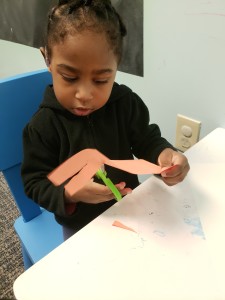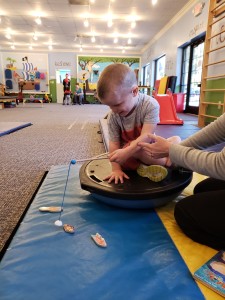Occupational therapy is the treatment designed to assist people of all ages to perform the functional tasks that normally occupy their lives. Pediatric occupational therapy focuses on sensory processing issues, cognitive, motor, and other developmental delays, as well as injuries and other impairments. One focus of pediatric occupational therapy is on pencil-grasp, pre-printing skills, scissor skills and hand-eye coordination skills. The overall concept behind this therapy is to develop the skills necessary to become functional and independent adults. Occupational therapy helps develop regulation of arousal level in order to attend, refinement of sensory discrimination and processing, refinement and development of fine motor skills, communication skills, social interactions, and age-appropriate self care skills. The occupational therapist will begin with initial screening for above stated concerns and continue with assessment and diagnosis, consultation, intervention and treatment. Your occupational therapist will also work to include a home exercise program for you and your child to complete for continued progress in the home environment.
Typical Diagnoses addressed by Occupational Therapy (but not limited to)
Developmental Delay
Cerebral Palsy
Down Syndrome
Autism
Asperger’s Syndrome
Poor Handwriting/Visual Motor Skills
Sensory Processing Disorder
Feeding Aversions
 How do I know if my child needs occupational therapy?
How do I know if my child needs occupational therapy?
Talk to your pediatrician. Your pediatrician can answer questions about typical fine motor control and sensory development. Does your child or patient have trouble picking up small objects, or poor writing? Is your child extra sensitive to touch, taste, sounds and/or odors? Does your child have difficulty with daily living skills (ie dressing, grooming, self-feeding)? This does not include all the reasons why your child may need occupational therapy, but your pediatrician will assist in the referral assessment and process.

